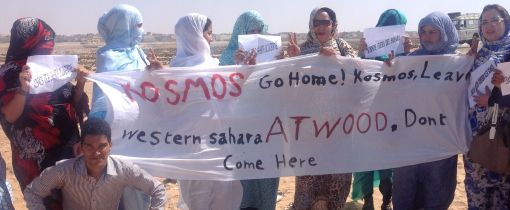
The US oil company Kosmos Energy is severely misrepresenting a joint-declaration which the OECD Contact Point in Norway mediated between the Norwegian Support Committee for Western Sahara and the fishing company Sjøvik AS.
The US oil company Kosmos Energy is severely misrepresenting a joint-declaration signed by our association (the Norwegian Support Committee for Western Sahara, NSCWS) and the fishing company Sjøvik AS, mediated by the OECD National Contact Point in Norway in 2013.
The oil company, which is awarded an offshore licence by the Moroccan government in the occupied territory, does that in an effort to try to legitimise its own controversial operations vis-à-vis third parties.
The misrepresentation appears in a letter sent from Kosmos Energy to the Council on Ethics of the Norwegian Government Pension Fund on 14 January 2016, available on the company's website.
The Council on Ethics had shortly before recommended the exclusion of Kosmos from its portfolios for violating fundamental ethical norms in Western Sahara.
NSCWS has on a few occasions over the last year heard rumors that Kosmos Energy refers to our signed declaration, but has until now never seen it spelled out in writing.
No part of the declaration which our association signed with Sjøvik addresses the company's operations in Western Sahara, apart from an introductory paragraph where it states that the two parties to the declaration fundamentally disagree on the company's presence in the territory:
The Norwegian Support Committee underlines in the joint statement that "the activities of Sjøvik AS are in violation of the Saharawis' right to control their own natural resources, and must therefore be discontinued", while Sjøvik, on the other hand "supports and respects the protection of internationally recognised human rights. The company has not taken a position on the views expressed by NSCWS, as this would be incompatible with its presence in the territory".
The joint-declaration furthermore contains an advice to the Norwegian government (which urges Norwegian companies to stay away from the territory), as well as tools that the fishing company should implement regarding its own overall human rights performance.
But Kosmos Energy still states that the declaration is an argument for carrying out oil search in Western Sahara, in the way that it "affirms that Sjovik was providing benefits to the people of the Western Sahara", "was was not in violation of applicable law or norms" and that the company "would continue its operations in a transparent manner".
That is flat out incorrect.
"Under no circumstance would our association sign a declaration with a company regarding the management of natural resources in occupied Western Sahara. We are not in a position to do that, just as little as Morocco, Sjøvik or Kosmos are. Only the Saharawi people can decide on their own resources", stated chair of the Norwegian Support Committee for Western Sahara, Magnhild Bøgseth.
Kosmos also suggests that the OECD contact point in Norway has made a decision on the matter, giving advise on how businesses should operate in Western Sahara. That is incorrect.
The full letter from The Norwegian Support Committee for Western Sahara can be downloaded here.
The letter calls on Kosmos Energy to stop spreading lies about the document that we have signed with Sjøvik, and to explain to us which third parties have received the false information.
The misuse of the document that we ourselves have signed echoes the consistent false representation of a UN Legal Opinion on such exploration by the same company.
Order our Western Sahara poster!
“Try to Visit Western Sahara”…
The Security Council fails Western Sahara and international law
On 31 October 2025, a new resolution was adopted in the UN Security Council calling on the Saharawis to negotiate a solution that would entail their incorporation into the occupying power, Morocco.
Saharawis Demonstrate Against Trump Proposal
The United States has proposed in a meeting of the UN Security Council on Thursday that the occupied Western Sahara be incorporated into Morocco.
Skretting Turkey misled about sustainability
Dutch-Norwegian fish feed giant admits using conflict fishmeal from occupied Western Sahara. Last month, it removed a fake sustainability claim from its website.



